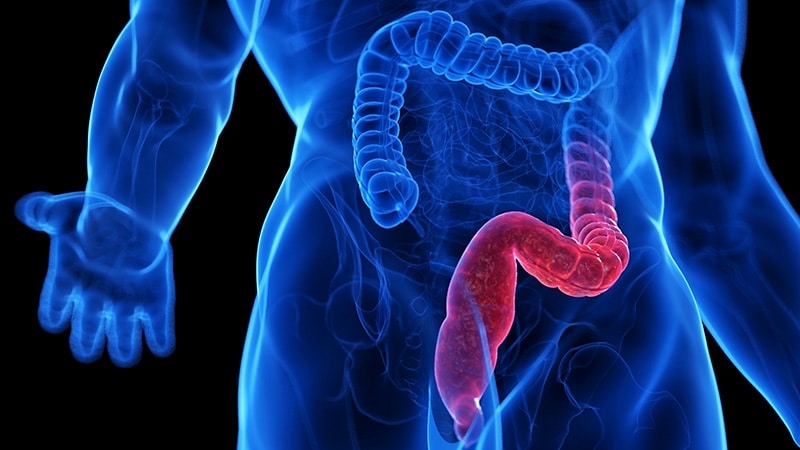TOPLINE:
Cyclosporin was effective in achieving clinical response and remission in adults with severe steroid-refractory ulcerative colitis (UC), enabling more than half of the patients to avoid colectomy.
METHODOLOGY:
- Researchers conducted a retrospective cohort study of 92 patients (mean age, 55 years; 54.4% men) with severe steroid-refractory UC between January 2001 and February 2024 to evaluate the short- and long-term effectiveness and safety of cyclosporin therapy.
- All patients received intravenous (IV) methylprednisolone (1 mg/kg/d) for 3-7 days as first-line therapy, and owing to unsuccessful treatment, they received IV cyclosporin (median, 3 mg/kg/d) for 5-7 days as second- or third-line rescue treatment.
- Clinical and endoscopic disease activity was assessed using the Mayo endoscopic subscore and the partial Mayo score (pMayo).
- The primary outcome was the rate of clinical response and remission to IV cyclosporin therapy. Clinical response was defined as any reduction in the pMayo score from baseline, and clinical remission was defined as a pMayo score of ≤ 2, with a rectal bleeding subscore of zero. In case of clinical response, IV cyclosporin was followed by oral cyclosporin treatment.
- Other assessments included colectomy-free survival rates and adverse events associated with cyclosporin therapy, with a median follow-up duration of 14 years.
TAKEAWAY:
- Overall, 88% of patients achieved a clinical response, with 23.9% reaching remission after the IV phase of cyclosporin therapy. Among those on oral cyclosporin, 41.9% showed relapse, whereas 40.7% achieved or maintained remission.
- Cyclosporin therapy was discontinued in 12% of patients owing to insufficient response to IV therapy and in 14.1% due to adverse events. Adverse events associated with cyclosporin were reported in 53.3% of patients.
- Moreover, 51.9% of patients who showed response to cyclosporin avoided colectomy. At 1, 3, 5, and 14 years after initiating cyclosporin therapy, the probabilities of colectomy-free survival were 74.7%, 62.6%, 57.1%, and 45.6%, respectively.
- Concomitant immunomodulator use was the sole predictor of clinical remission after treatment with oral cyclosporin (odds ratio [OR], 6.41; P = .002), and hypoalbuminaemia (serum albumin levels < 35 g/L) at the start of therapy was the sole predictor of adverse events (OR, 0.36; P = .03).
IN PRACTICE:
“[The study] findings suggest that the effectiveness of CsA [cyclosporin] may be enhanced by the concomitant use of IMT [immunomodulator therapy] in active, severe, steroid-refractory UC, without compromising safety,” the authors of the study concluded.
SOURCE:
This study was led by Bernadett Farkas, MD, Department of Internal Medicine, SZTE SZAKK Center for Gastroenterology, University of Szeged, Szeged, Hungary. It was published online on August 08, 2025, in Therapeutic Advances in Gastroenterology.
LIMITATIONS:
The study’s retrospective design may have introduced confounding due to inherent differences in assessments. The sample size was small, and thus, the minimum effective dosage and duration of concomitant immunomodulator therapy were not identified.
DISCLOSURES:
This study received funding through a grant from the EU’s Horizon 2020 research and innovation program, with additional support being received through grants from the National Research, Development and Innovation Office; the János Bolyai Research Grant; and the Géza Hetényi Research Grant from Albert Szent-Györgyi Medical School, University of Szeged to the authors. Two authors reported receiving speakers’ honoraria from various pharmaceutical companies.
This article was created using several editorial tools, including AI, as part of the process. Human editors reviewed this content before publication.
Source link : https://www.medscape.com/viewarticle/cyclosporin-therapy-viable-option-severe-ulcerative-colitis-2025a1000lfa?src=rss
Author :
Publish date : 2025-08-15 12:00:00
Copyright for syndicated content belongs to the linked Source.
